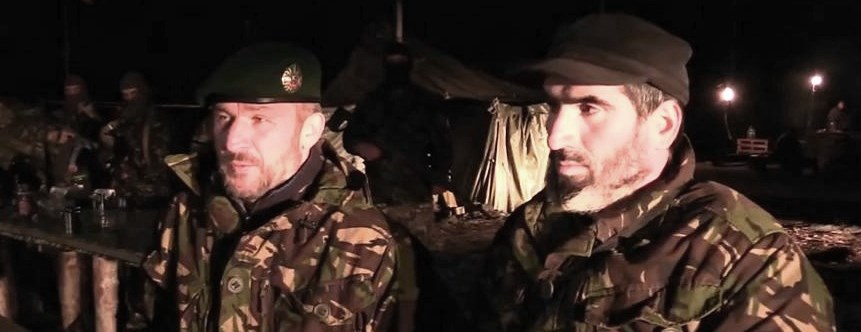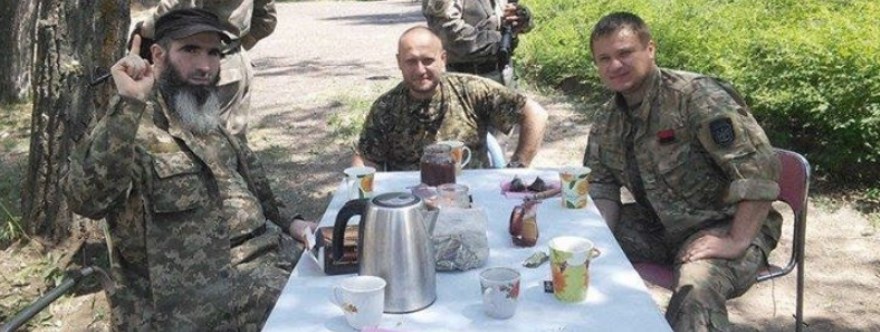Chechen collaboration with Ukraine

In the mosque; the main Chechen leaders in Ukraine, Adam Osmaev, second from left, and beside Muslim Cheberloevky.
The presence of Chechen militants is evident in almost all the events that accompany the taking of power by the Ukrainian nationalist forces, including the insurrection of Maidan.
Since early March 2014, the organization Свободный Кавказ (Free Caucasus), led by Isa Munayev and Ilyas Musayev, decided to organize an international battalion of volunteers to support the nationalist forces in Ukraine, the Battalion Dudayev . Ukrainians, Tatars, Chechens and other persons originating from the Caucasus respond to the call for mobilization. That same month the first company of Battalion Dudayev, called Sashko Bilyi, after the far-right Oleksandr Muzychko, leader of Ukrainian volunteers during the Chechen wars is formed.
The success of the call for mobilization by the group and Musayev Munayev results in October in the creation of a second Chechen Battalion, led by a Soviet exmilitar of Chechen origin, nicknamed Muslim Cheberloevky.
In an article that collects web Golos Ichkerii , Ilyas Musayev says met Cheberloevky early 90s who later became the second president of the Chechen Republic of Ichkeria, Zelimkhan Yandarbiyev, during the Congress of the Confederation of Peoples of the Caucasus in Sukhumi Abkhazia. After Dudayev's call in October 1991, calling for the return to Chechnya of military origin that enrolled in the Soviet Army Republic, Cheberloevky returned to Chechnya to join, according to some sources, Dudayev's presidential guard. Since then, and after participating in the two Chechen wars, today the leader of Sheikh Mansour seek confrontation with Russia on all fronts open military. "We've never run away from our war with Russia and never will," says Andrew E. Kramer in the article by The New York Times published this week.According to the journalist, the last country of residence before reaching Cheberloevky Ukraine would have been France.
Several features characterize the Chechens who come in support of the Ukrainian nationalist movement. It is, first of militants linked to the political structures of the Chechen Republic of Ichkeria in exile. Musayev Munayev and are characterized by long part of the organization led by Zakayev, acting in its military wing. According to some sources, Adam Osmayev, who would assume the command of Battalion Dudayev after the death of Debaltsevo Munayev in early February 2015 is also part of the military structure.
The symbols of the Battalions Dudayev and Sheikh Mansour reflect the proximity to structures originating in the Chechen rebellion. However, the downfall of Zakayev between the media of the Chechen diaspora in an area located some autonomous way the current Chechen militants in Ukraine, with a possible opening for groups with closer links to the alternative organization, the Caucasus Emirate and its derivatives. Some sources say in fact the arrival of Chechen militants from Syria that could relate to these organizations greater Islamist roots.
It should be mentioned in this context, the obvious religious and Muslim Sheikh Mansour Battalion dimension, away from the more religiously neutral image Battalion Dudayev, a circumstance that could lead to place the group in a nearby religious radicalization process your reference, Yandarbiyev. However there is no evidence of a systematic use of symbology of near Al Qaeda or ISIS, at least for the time movements.
The second aspect is the involvement of Chechen battalions to the right sector and their support structures, including in all probability in the initial moments mogul Dnipropetrovsk, Ihor Kolomoisky. In early March, a few days before the decision to launch the Battalion Dudayev, Dmitro Yarosh makes an appeal to revive the Chechen confrontation with Russian organizations, collaborating in the war in Ukraine. Yarosh then demanded the return of the support in the mid-90 contributed to Chechen Muzychko group. Died in strange circumstances that have not yet been clarified, just weeks after the triumph of the revolution in Maidan, Muzychko was one of the most radical leaders of Ukrainian nationalist outlook, leading the organization of the right sector in western Ukraine.
Collaboration with the right sector has become particularly narrow in the region of Mariupol where Sheikh Mansour battalion fought alongside units of the organization Yarosh. The photos of the numerous meetings between top leaders, Yarosh and Cheberloevky credited collaboration. Sheikh Mansour however maintains its operational autonomy, not being strictly subordinated to the right sector or the military sense.

Yarosh Cheberloevky with Chechen members posing with Sheikh Mansour Battalion Battalion who want to keep anonymous.
The collaboration between the Battalion Sheikh Mansour and the right sector could surprise, given the strict nature of the Chechen Muslim group and the distinctive features of national Catholicism of Yarosh and much of the radical political movement that revolves around it. This collaboration is not too strange if the alliance, within the World Anti-Communist League (WACL), held in the 70 and 80 the Ukrainian nationalist forces led by Stetsko, radical Catholic groups like Los Tecos and the Saudi group is remembered represented by Salah Jamjoom.Support for the Nicaraguan Contras and Afghan mujahideen by WACL structures are two clear examples of this collaboration between religious groups in radically different appearance. For them, however, communists and defenders of liberation theology were part of the same common enemy to fight anywhere in the world.
The third aspect is the anti-Russian Chechen radical group operating in Ukraine for a radicalism that leads to sharing the simplistic and unilateral assessment of the situation that tries to spread nationalism in Ukraine. To the right sector, as for the Chechens arrived in Ukraine to fight the fight in this country lacks nuance other than a plain old confrontation between the liberating forces of Maidan and imperial Russia, embodied in practice on one man, Vladimir Putin. Putin is, in fact, the real referent and sense of Chechen presence in Ukraine.
It is without doubt a distorted and dangerous view of the facts that may even cause unwanted whom, from the West, support or are sympathetic to the Chechen assistance to Ukraine problems. A significant feature of this Chechen movement in Ukraine is precisely the closeness of it to the radicalized structures mobilizing anti-Russian and pro-Chechnya who have performed in the US in recent years.
So striking to see appear between political support to Chechen Ukraine, some of the characters who both contributed in the past to the radicalization of the Chechen diaspora in cities like Boston. In 2009, one of those characters, of Ukrainian origin, defended the thesis that "The Chechen people are in the same situation as the Jews during the Holocaust," noting that Putin's regime was the result of "betrayal of the West to the best aspirations of Dudayev and Maskhadov ".
As demonstrated by the actions of the Tsarnaev in Boston, or groups of nearby Blind Sheikh, Sheik Omar Abdel Rahman, New York in 1993, flirting with extremists and propagators of hatred potentially poses great risks.


No comments:
Post a Comment